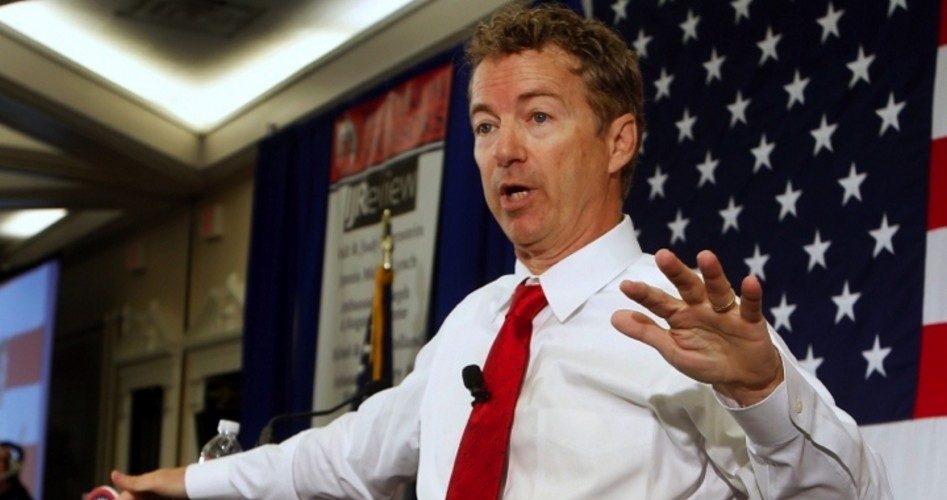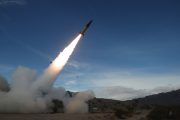
Senator Rand Paul of Kentucky was not bashful about setting himself apart from his more hawkish rivals for the Republican presidential nomination at the Republican Leadership Summit, an early pre-primary event in Nashua, New Hampshire, on Saturday as he warned against “a group of folks within our party” that would get the country into more international crises than Barack Obama and Hillary Clinton have created.
“There’s a group of folks in our party who would have troops in six countries right now — maybe more,” the Kentucky senator told the hundreds of party activists who had turned out to hear Paul and 19 other prominent Republicans who may be contenders in New Hampshire’s first-in-the-nation presidential primary early next year. “This is something, if you watch closely, that will separate me from many other Republicans,” Paul said. “The other Republicans will criticize Hillary Clinton and the president for their foreign policy, but they would have done the same thing — just 10 times over!”
Rather than promoting stability and enhancing national security, our military interventions overseas have had the effect of creating greater instability and more opportunities for our enemies to gain power, Paul said. Speaking fewer than 24 hours before a boat carrying an estimated 700 people fleeing the chaos and violence in Libya capsized in the Mediterranean, Paul cited the example of Libya, where the U.S. and European allies conducted an air war that led to the overthrow of dictator Moammar Gadhafi and the rise of anti-Western jihadists.
“Why in hell did we ever go into Libya in the first place?” Paul asked. “Every time we’ve toppled a secular dictator, a secular strongman, we’ve gotten chaos and the rise of radical Islam,” he said. “We have to decide when getting involved is good and when it’s not so good. There’s a group of folks in our party who think it’s always good.… There’s people in our party who supported giving arms to Gaddafi before they supported giving arms to the ‘freedom fighters,’ who turned out to be al Qaeda.”
Paul, who has been accused of “isolationism” by more hawkish members of his party, insisted he was not calling for America’s retreat from the world, but was instead cautioning against military intervention as a reflex response. “I’m not saying don’t be involved in the world. I’m not saying don’t defend our interests. But think about it,” he said. “Everyone who will criticize me wanted troops on the ground, our troops on the ground, in Libya,” he said. “It was a mistake to be in Libya. We are less safe. Jihadists swim in our swimming pool now. It’s a disaster.”
Responding to a question from the audience, Paul joined the other speakers in blasting Hillary Clinton. Paul suggested the former secretary of state and current Democratic presidential candidate might need two campaign planes — “one for her and her entourage and the other for her baggage.” Paul accused the former secretary of “dereliction of duty” in not providing the additional security requested by the U.S. embassy in Libya and for the lack of security at the U.S. outpost in Benghazi where the attack by heavily armed militants on September 11, 2012 resulted in the death of four Americans, including the U.S. ambassador to Libya, J. Christopher Stevens. Clinton’s mishandling of the situation in Benghazi should forever “preclude her from holding higher office,” he said.
Paul said he supports taking military action against the Islamic State of Iraq and Syria and even introduced a resolution calling for a declaration of war against ISIS, since the Constitution requires a declaration of war to come from Congress, not the president. But, he added, ISIS has been strengthened with the help of U.S. weapons and U.S. intervention in Syria’s civil war.
“How did ISIS grow stronger?” Paul asked. “Well, we put 600 tons worth of weapons into the Syrian civil war. You’ve got Assad on one side. You’ve got two million Christians living under Assad. And then you have the Islamic rebels. All the weapons we gave to the Islamic rebels … a lot of them wound up in the hands of ISIS.”
Paul insisted it was foolish to support arming the rebels in Syria in the first place and said he is proud of having voted in the Senate against it.
“There’s nobody good in that civil war,” he said. “There’s not one Islamic rebel group that would recognize Israel.… The next time you come across somebody who is either from Syria or is a Syrian Christian or related to one, you ask them, ‘Which would you pick: ISIS or Assad?’ No question, they’d pick Assad because he’s tolerated Christians to a certain extent. He’s not a great guy — he’s a tyrant — but compare that to ISIS.”
An ophthalmologist who has performed hundreds of eye surgeries in his medical career, the first-term senator said he is guided in his foreign and military policy convictions by words from the Hippocratic oath. “As a physician, we’re taught: first, do no harm,” he said.
Though Paul did not mention any names when speaking of his critics within the party, clearly Arizona Senator John McCain and Senator Lindsey Graham of South Carolina are foremost among them. Both senators criticized Obama for not doing enough to arm the Syrian rebels and both claimed the president had bombed too few targets in Libya. Graham, who said he will decide in the next few weeks whether he will enter the race for president, spoke a few hours after Paul at the Nashua conference and said the United States will have to send ground troops back into the Middle East to fight Islamic terrorists.
“The people taking this stage, telling you ‘Just leave them alone, stay away from those people, don’t get involved,’ well, that won’t work because they’re not going to leave you alone,” Graham said. Speaking of Paul, Graham told Reuters: “His foreign policy views are more in line with Obama than they are with the Republican Party.”
Former Ambassador to the United Nations John Bolton, a potential presidential candidate who has called for bombing Iran over its alleged nuclear weapons program, was equally dismissive of Paul. “Obviously, Rand Paul’s an outlier,” Bolton told Reuters.
Undeterred by the failure of their prescriptions to produce the desired results in Iraq, Afghanistan, Libya, and elsewhere, the Grand Old Party’s hawks seem eager for more wars in the Middle East. To update Santayana, the problem now is that so many who will not learn from history are foreign policy experts in Washington, D.C.
Photo of Sen. Rand Paul (R-Ky.) speaking at the Republican Leadership Summit in New Hampshire April 18: AP Images



